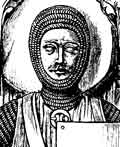| The younger son of John FitzGilbert the Marshal, William was knighted in 1164. He vanquished in the tournaments, where his successes gained him fame as the model of chivalry. In 1170 he became a guardian to Henry, the Young King. After the Young King's death (1183), William went on crusade and returned to England in 1187. He acquired vast estates and a "tenuous" claim to the earldom of Pembroke and Striguil by his marriage to Isabella de Clare in 1189. William inherited the office of marshal and estates of his elder brother when the latter died without legitimate offspring in 1194.William helped King John and secured his succession after the death of Richard I. In recognition of his services, he was formally installed as Earl of Pembroke and Striguil on 27 May 1199. On his death-bed, King John begged to ensure that his heir, Prince Henry (later King Henry III), was entrusted to the guardianship of Marshal. Immediately after the coronation of Henry III (28 Oct 1216), the king and kingdom were entrusted to Marshal's care "by common counsel". As he needed to move about the kingdom, William entrusted the young king to the care of his previous governor, Peter des Roches, bishop of Winchester. On 11 Nov 1216 a great council met at Bristol to provide for the government during Henry's minority. William had been calling himself "justiciar" since his appointment despite the fact that John's last justiciar, Hubert de Burgh, was not formally dismissed. The response was to devise a new title for William, who was now called by the king "governor of our person and our kingdom" (rector noster et regni nostri). In 1217 William defeated the rebellious barons and their French allies led by Prince Louis (later King Louis VIII of France) and concluded the treaty of Lambeth (11 Sep 1217). On 9 Apr 1219 William, smitten with a mortal illness, resigned his office in a council at Reading and died the next month. Biography source: [1] |

